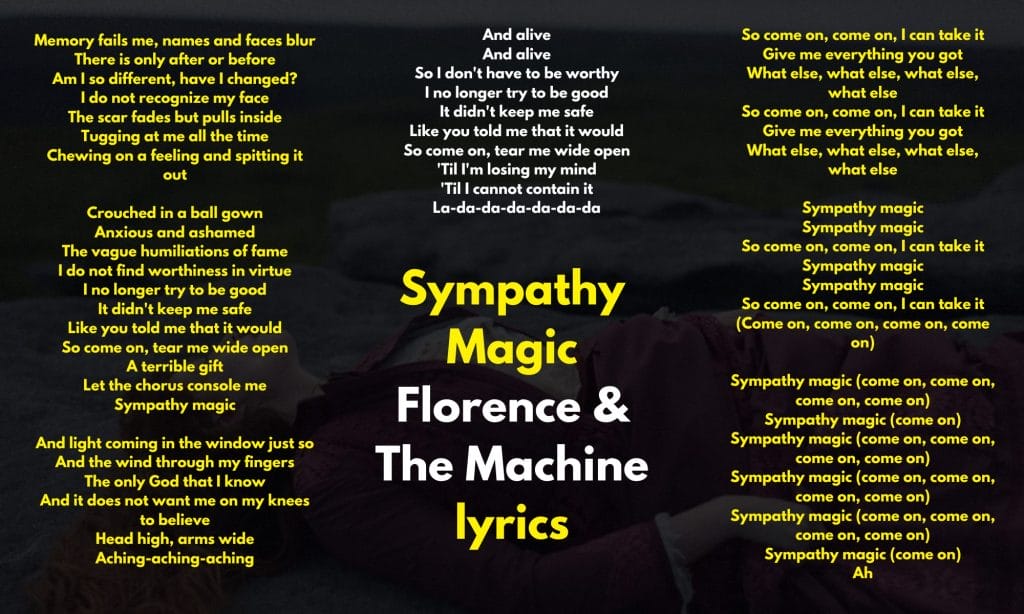
Sympathy Magic Florence & The Machine Lyrics And Meaning: To Be Torn Open and Still Keep Going
Screenshot from the official Sympathy Magic music video by Florence + The Machine. Directed by Autumn de Wilde. © 2025 Universal Music Operations Limited. Used under fair use for commentary and analysis.
Florence + The Machine’s “Sympathy Magic” came out just days before Everybody Scream, and it has already been positioned as one of the more personal pieces on the record. Danny L. Harle and Aaron Dessner produced it, and if you know their work, you can already hear how that kind of collaboration would pull something this raw into focus. She performed it live on Fallon the same night the video dropped, which gave it the kind of spotlight that usually hints at what the team sees as a centerpiece.
But the track doesn’t sound like it was built for big reaction. It sounds like something made quietly and honestly, then left open for others to interpret. I see it less as a single and more like a field recording from inside her own reconstruction process.
I wanted to write about this song because I kept going back to it, and each time I found something quieter under the loud parts. The lyrics started to sit with me in a way that felt familiar, not just as a listener but as someone who’s spent time with English literature and creative writing. That background usually finds its way in, so this piece folds those instincts into the reading. None of what follows is meant to be definitive. I’m just trying to take the song seriously and see what it lets in when you hold it up next to other work that has tried to name the same kind of pain.
There’s room in this track to think about how survival and performance can coexist, and what happens when neither of those things really works anymore. It felt like the right space to stretch the lens and let some of the deeper references move in around the music.
Sympathy Magic Florence & The Machine Full Lyrics
Sympathy Magic’s Best Lyrics
“Memory fails me, names and faces blur / There is only after or before”
These lines open the song and set the stage for what I believe the artist is communicating: a sense of dislocation in time and identity. The speaker says memory fails, faces blur, and the only markers left are “after” or “before.” In my opinion, that suggests a rupture has occurred—a life divided into what came before the wound and what follows it.
In my own work I often tell producers that when we revise a track after a major event, the “before” version of ourselves no longer matches the “after.” Here the artist signals that same gap.
In the poem by Ingeborg Bachmann titled Bohemia Lies by the Sea, we find lines like “I wish I were at home / and I am at home.” Bachmann frames belief and identity as tied to place and the feeling of being returned to. In the song, the speaker looks at their own face and asks “Have I changed? / I do not recognize my face.” That echoes the fragmentation Bachmann describes. It confirms that the speaker’s sense of self has been broken open.
“The scar fades but pulls inside / Tugging at me all the time”
Here the artist illustrates trauma as an internal wound. Outward appearance may improve, yet the pain remains active beneath the surface. In my experience working with performers I hear this all the time: public presence is polished, but something tugs inside constantly.
This is closely tied to the idea of a persistent internal scar. The language “pulls inside” and “tugging” suggests a bodily sensation, a memory of damage that stays with the speaker over time.
In The Glass Essay, Anne Carson explores the body as a place where this kind of ache continues, even when the event itself has passed. She writes, “I could not touch the wound / but I could feel it.” The speaker in the song is doing the same thing—naming the damage, refusing to hide it, and allowing it to stay real. For anyone building this into a production workflow, this section of the lyrics might suggest space for a low-frequency presence that holds tension across time.
The scar continues underneath the sound.
“I do not find worthiness in virtue / I no longer try to be good / It didn’t keep me safe / Like you told me that it would”
Here we see the speaker rejecting the belief that moral behavior or virtue guarantees protection. In my opinion, this is the heart of the song’s philosophical turn. The speaker says the rules they followed did not save them. That realization changes how they engage with themselves and the world.
The artist mentioned that this song came in the wake of a near-death experience, one that changed her understanding of safety and trust. That helps clarify why the lyric moves away from ideas like virtue and worth. The speaker recognizes that being good did not result in being cared for.
This mirrors the thinking in Paul Celan’s later poems, which argue that systems of order and divinity are no longer trustworthy after great personal and historical trauma. In one line he writes, “Whichever word you speak / you owe to destruction.” That kind of language helps confirm the lyric’s rejection of safety through virtue. It reflects a break from anything that promised shelter and then failed to provide it. When translated into sound, this moment in the song might be where the structure loosens, or the harmony drops away from traditional patterns. The ground gives out because the beliefs have fallen apart.
“So come on, tear me wide open / A terrible gift / Let the chorus console me / Sympathy magic”
These lines articulate a plea for exposure, for catharsis through shared presence. “Tear me wide open” signals readiness for full vulnerability. Calling it “a terrible gift” names the pain and the necessity of it. The phrase “Let the chorus console me / Sympathy magic” moves this into a collective act. In my opinion, this is where private pain turns into public ritual.
The artist has said before that she draws from mysticism, folk imagery, and ritual when shaping her songs. That comes through clearly here. The chorus becomes a space of shared feeling, not performance.
Returning to Bachmann again, she once wrote, “If Bohemia still lies by the sea I’ll believe in the sea again.” The idea is simple. If there is still something out there that can hold truth, then maybe it is worth trying again. That’s the same movement this lyric makes. The speaker cannot find safety in rules or gods, but maybe the chorus—the sound, the sharing—can hold something that gives relief. For producers, this is where layering the vocal textures matters. The chorus should feel wide, held, and human.
“And the wind through my fingers / The only God that I know / And it does not want me on my knees to believe”
Here the speaker replaces religious faith with sensory experience. Instead of an external force demanding worship, the only sacred presence left is the wind, the light, the body’s connection to the world. This is direct, grounded, and practical.
From a production standpoint, this line invites restraint. Let the space breathe. Bring in textures that feel open and unforced. Wind as presence, not atmosphere.
Anne Carson again gives us a parallel. Her speaker walks through broken landscapes and tries to name what remains. She writes about belief that no longer rests in doctrine. Instead, the body holds the ache and the memory. In this song, the speaker finds their god in what touches them gently and makes no demands. The old symbols have fallen away, but the world still moves around them.
“Head high, arms wide / Aching-aching-aching / And alive / And alive”
This is the center of gravity for the whole piece. The speaker takes a full-body posture—arms wide, head high—and pairs it with aching. The pain and the vitality are presented together. In my opinion, this is where the speaker finds a way forward. Not through healing or erasure, but through fully allowing the body to feel.
Celan has a word for this: the “breathturn.” A moment when language, breath, and presence align. He believed that poetry could still hold that kind of space after everything else falls apart. This lyric does that. It holds the ache, and in doing so, it affirms life.
For producers, this is the place to allow the sound to expand. You might pull back from tight patterns here and let the vocal stand in its own space. The lyric carries weight on its own. The sonic environment can let it do so. Head high. Arms wide.
Still here.
Sympathy Magic Meaning
Florence Welch wrote much of Everybody Scream after a medical emergency that ended her tour and forced her to confront her body in a new way. In interviews, she spoke about recovery in a physical and spiritual sense, where healing and disorientation happened side by side.
Sympathy Magic carries that feeling clearly. Memory drifts, the self feels distant, and the scar keeps pulling under the skin. Ingeborg Bachmann’s Bohemia Lies by the Sea lives in that same territory, where identity has been shaken and the idea of home feels far away and uncertain. Both the poem and the song hold this kind of survival quietly, as if speaking from inside it rather than performing it for anyone else.
Anne Carson explores this same condition in The Glass Essay, where pain stays in the body long after the source has passed. She writes from kitchens, fields, and empty rooms, treating hurt as part of daily awareness. Sympathy Magic moves through that same understanding.
The speaker admits that virtue did not bring safety and begins to look for truth in what the body can touch—light on skin, air on fingertips, a kind of god that exists without rules or expectations. Her voice reaches for honesty instead of comfort. This is the same move Carson makes: attention to what is present, even when it aches.
Paul Celan’s late poems take language into this territory too. His writing breaks into fragments and breath, as if words have to pass through fire before being spoken. Sympathy Magic mirrors this musically. The structure loosens. Words thin out into raw sound. The voice opens and strains.
The chorus functions like shared space—many voices holding what one voice cannot carry alone. There is no attempt to hide what hurts.
The song allows it to stay, to breathe, and to keep moving forward through sound.



